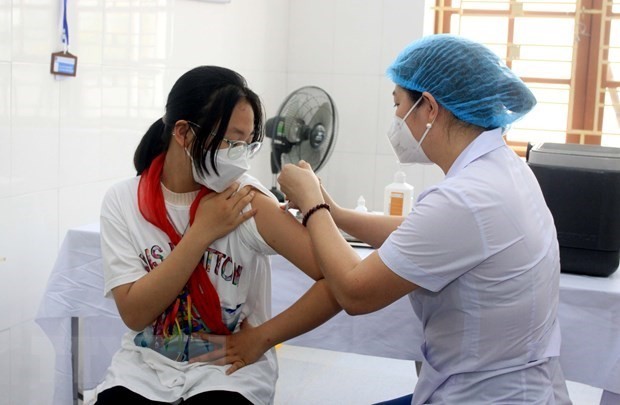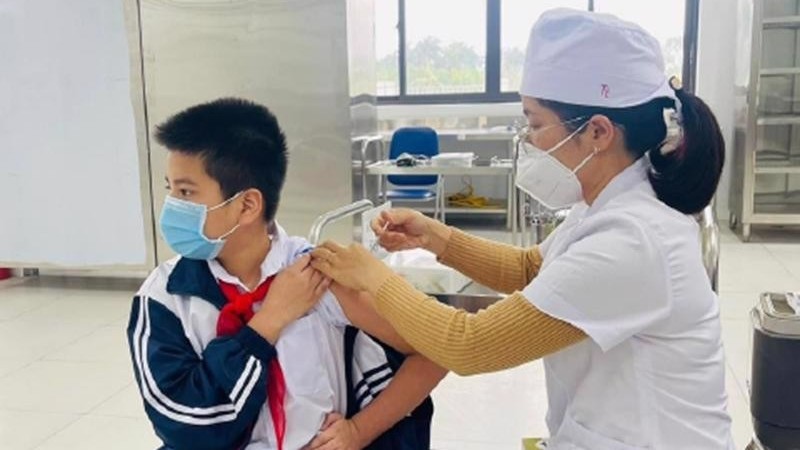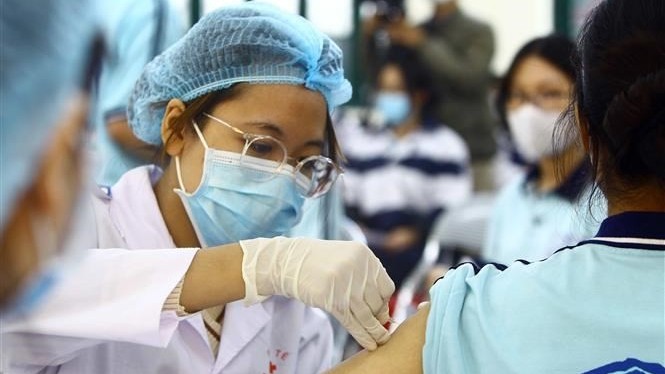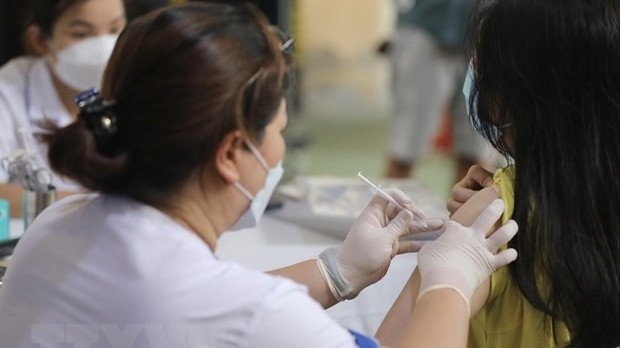
Vaccine diplomacy: An unprecedented campaign in history
Latest
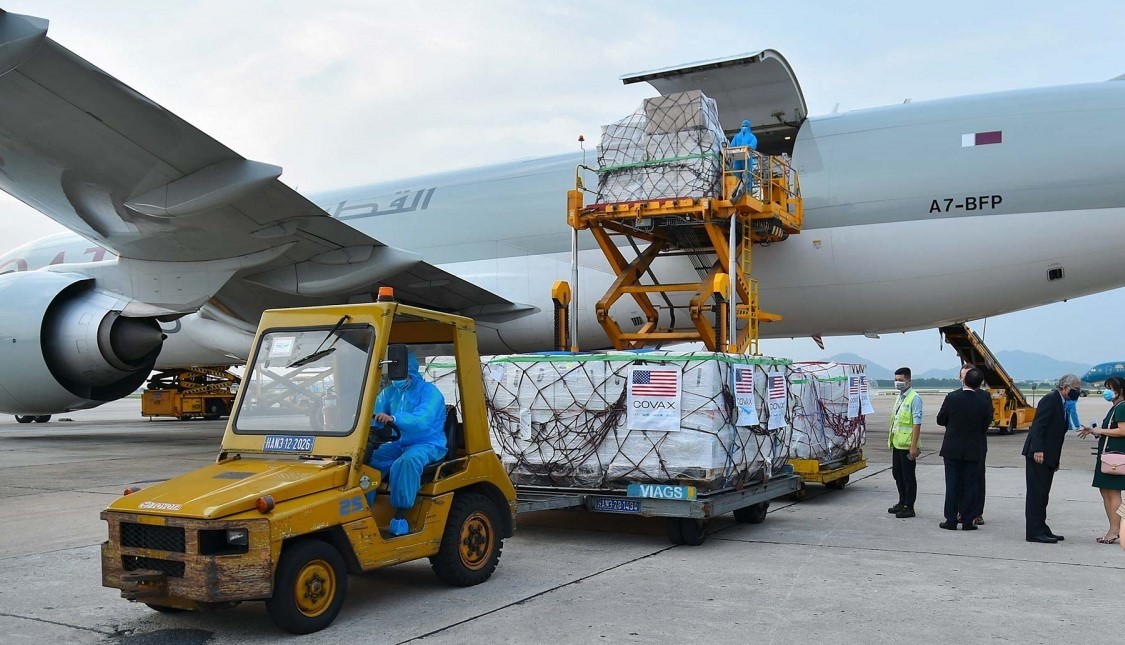 |
| Viet Nam has received COVID-19 vaccine shipments from donors. (Photo: VOV) |
Viet Nam was confronted with the fourth wave of the COVID-19 pandemic in late April, 2021, when initial cases were recorded in the north. At the time, the country had just injected 320,000 doses of the COVID-19 vaccine following the launch of a nationwide vaccination campaign in March. However, five months later, approximately 47 million doses had been administered after the Government switched to a strategy of living safely alongside COVID-19.
To date, all Vietnamese citizens aged 18 and above have now received their initial doses, with 90% of them getting their second shots. In addition, 86% of people aged 12 to 17 have now received their first doses, with 57% of them getting their second jabs. The Ministry of Health is currently negotiating alongside vaccine manufacturers and suppliers in order to purchase roughly 22 million doses for children aged five to 11.
These impressive figures are the best testament to showcasing the true success of the vaccine diplomacy strategy.
It’s worth remembering that Prime Minister Pham Minh Chinh decided to establish a working group on vaccine diplomacy on August 13, 2021. At that time, the outbreak had reached its peak in Ho Chi Minh City, with the daily number of new infections and deaths both recording a sharp increase, leading to the situation to put great pressure on the working group.
Unprecedented campaign in history
As a person directly involved in the campaign, Nguyen Minh Hang, Assistant to the Foreign Minister, outlined that the country had promoted vaccine diplomacy amid a very difficult context. One of the most significant challenges was how to choose, decide, and devise a strategy for vaccine diplomacy.
“Because this was an unprecedented campaign, we couldn’t imagine what and how to do. One of the difficulties at that time was to make a policy on vaccine diplomacy. And even when the policy was put forward, it was hard to implement it", recalled Hang.
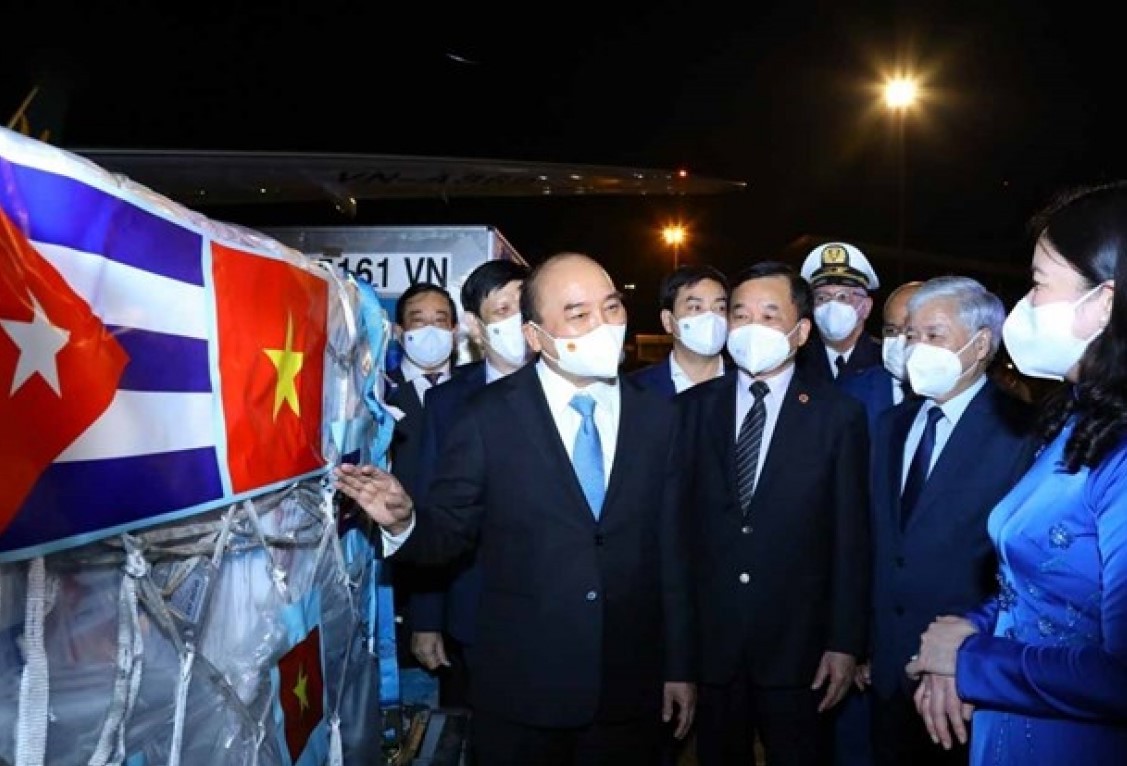 |
| State President Nguyen Xuan Phuc hands over vaccines and medical supplies donated by foreign friends during his trip to Cuba and the United States. (Photo: VOV) |
At that time, several COVID-19 vaccines were commercially available in the global market. As they were new, they not only ran risks, but there were also questions raised over supply. The world’s vaccine demand was estimated to stand at over 10 billion doses, but by mid-2021 just over four billion had been secured. In this context, problems arose regarding vaccine distribution and accessibility, and many countries complained about unequal access to vaccines globally.
With this going on, Viet Nam was not placed in the priority list of vaccine recipients as it was evaluated to have effective control over the pandemic.
“We ran into enormous difficulty in accessing vaccines because the supply of vaccines is limited while developed countries had already ordered vaccines in large quantities", recalled Deputy Health Minister Do Xuan Tuyen.
There were also difficulties when Viet Nam bought vaccines from other countries rather than from manufacturers or suppliers. Then came other problems, ranging from the price to payment and shipping methods, particularly as vaccines have a definite lifetime, meaning that Viet Nam could not prolong the negotiation process.
“There were Ambassadors who had to shed tears when they felt too stuck and didn't know how to achieve the expected results, and they felt ‘guilty’ if their negotiation efforts turned meaningless", said a diplomat.
Upon reviewing the results of vaccine diplomacy, Hang noted that the two most difficult matters were to sell the campaign overseas and coping with local pressure in order to get as many vaccines as possible and as swiftly as possible.
“We started to deploy vaccine diplomacy at the beginning of June, 2021, when we had about 2.6 million doses out of a total of 150 million doses as required by the Government", said Hang, “At that time, the pandemic broke out relatively rapidly in Ho Chi Minh City and other southern localities. Therefore, the demand for vaccines was very large. By August 2021, we have just secured between 15 million to 16 million doses of vaccine. There was intense pressure on us”.
Decision made in just a day
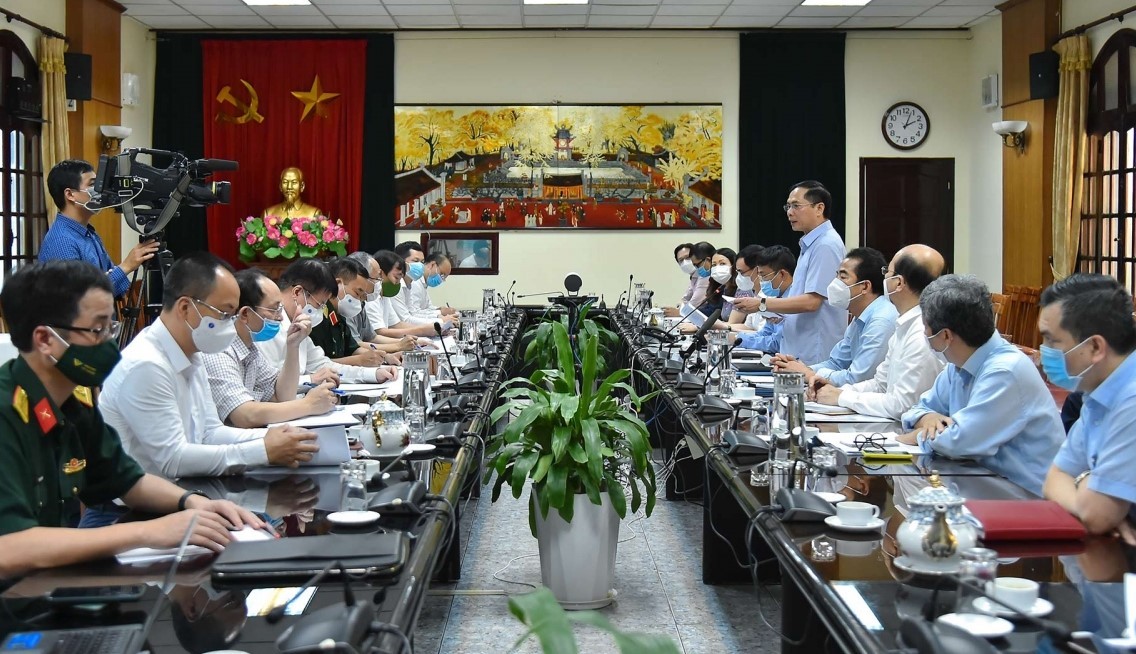 |
| Foreign Minister Bui Thanh Son chairs a meeting of the Government working group on vaccine diplomacy. (Photo: VOV) |
With the directions taken by the leadership, especially the Prime Minister, Viet Nam strived to make full use of all relationships and partnerships with countries and organizations through all channels as a means of promoting its vaccine diplomacy strategy.
Following the Government’s decision to establish a working group on vaccine diplomacy on August 13, 2021, competent officials from five ministries and agencies were dispatched the following day to join the group and they got down to work on negotiations.
“We worked together in the fastest possible way, in which co-operation between the Ministry of Foreign Affairs and the Ministry of Health played an important role", said Hang.
Furthermore, the country has made full use of bilateral and multilateral meetings and forums, especially virtual and physical talks held with comprehensive and strategic partners, in order to lobby for its vaccine diplomacy campaign. From the very beginning, it emphasized equitable access to vaccines and called on countries to contribute to the COVAX facility.
All of these efforts paid off, with the country’s partners all committing to providing vaccine. Many countries agreed to donate vaccines through COVAX, while others decided to lend their unused vaccines.
“Our approach was also flexible and was adjusted continuously from month to month and even from week to week”, said Hang.
“A sacred mission”
When the outbreak peaked in Ho Chi Minh City with the daily numbers of new infections and deaths skyrocketing, the working group on vaccine diplomacy and Vietnamese Embassies abroad did their utmost to bring vaccines back in order to help the situation at home.
Vietnamese Ambassador to the United States Ha Kim Ngoc described vaccine diplomacy as a “sacred mission”, which he believes helped to protect the lives of fellow citizens in the homeland.
“The success of vaccine diplomacy resulted from correct leadership and drastic efforts by all ministries and agencies, from home to abroad. Those efforts bore fruit when more than 100 million doses of vaccines were delivered to Viet Nam within more than four months”, said Ambassador Ngoc.
The entirety of the political system was required to get involved in the campaign. Senior leaders such as the Party General Secretary, State President, Prime Minister, and National Assembly Chairman all directed and strongly engaged in the implementation of the vaccine diplomacy strategy.
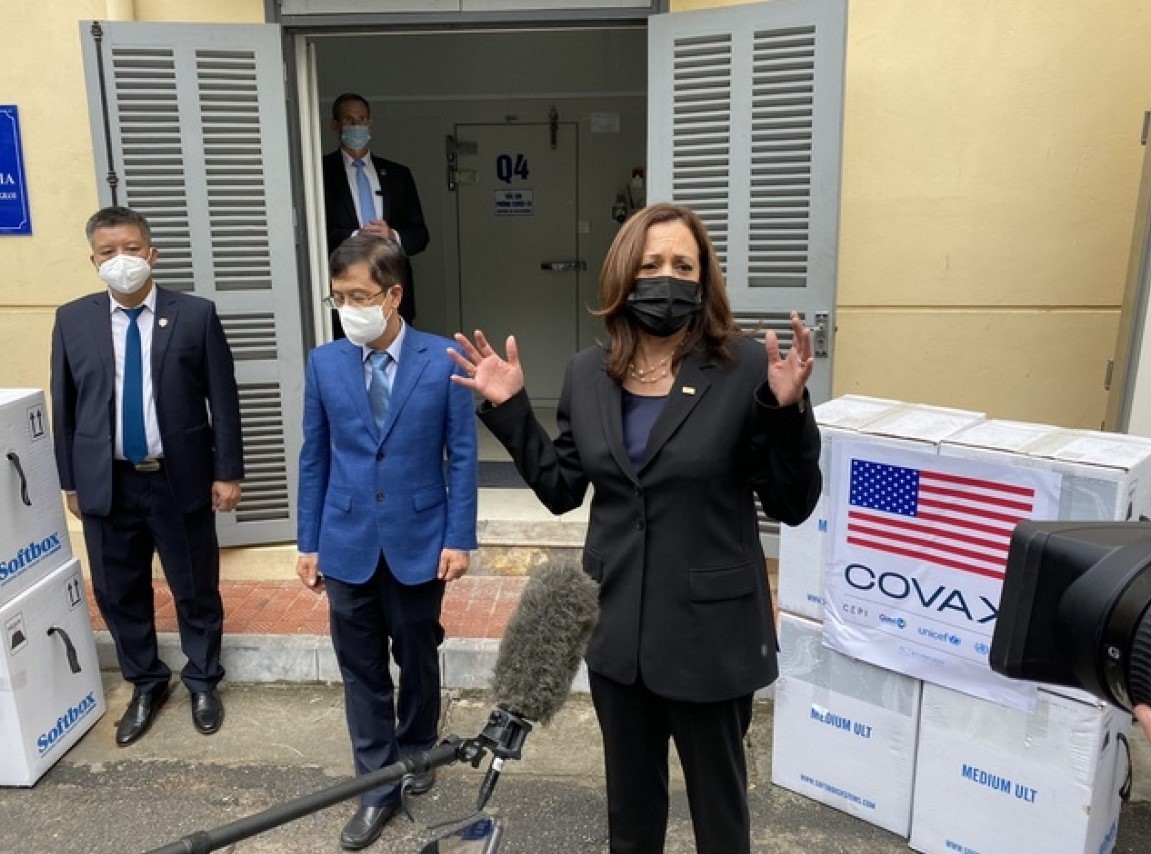 |
| Vice President of the United States Kamala Harris visits the National Institute of Hygiene and Epidemiology in Ha Noi on August 26. (Photo: Twitter/Jenny Leonard) |
Moreover, the Prime Minister held phone conversations with the leaders of 16 countries, sent letters to the leaders of 22 countries, and phoned and sent letters to the leaders of 10 international organisations in a bid to promote Vietnamese vaccine diplomacy. He also directly ordered the Ministry of Health, the Ministry of Foreign Affairs, and other relevant ministries and agencies along with more than 90 overseas Vietnamese representative agencies to take part in this campaign.
Alongside the bilateral channel, Viet Nam also promoted vaccine diplomacy at multilateral forums, calling on the international community to introduce solutions to vaccine inequality and scarcity. In addition, it also contributed 500,000 USD to the global vaccine fund.
Both the National Assembly and Government in their recent year-end review meetings singled out vaccine diplomacy as a great success, particularly as it contributed to making Viet Nam one of the six countries boasting the highest vaccination coverage in the world.
The ultimate success of the vaccine strategy can be viewed as a decisive factor for Viet Nam in controlling the pandemic, opening up its economy, whilst simultaneously developing and integrating in the ‘new normal’ period.
In addition to vaccine access and import, Viet Nam is now promoting co-operation in technology transfer and vaccine production in order to ensure a long-term and stable vaccine source for domestic use.




